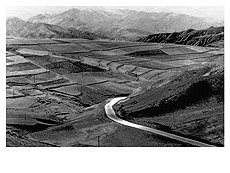The Roads of Kiarostami
 Paths are key to poets and artists as they naturally help to tell a story and to visually give perspective. The highest commonality between us is that we are on a road that goes nowhere. On paths. In Kiarostami's case, on paths through wide fields, valleys, mountains and snow. In Kiarostami's film "The Roads of Kiarostami," the camera follows paths on still photograph and then opens up to context, questioning if context matters at all, and simultaneously showing the absolute beauty that surrounds a man on his journey - saying, what could be more important? High contrast with lines that are sometimes jet black through snow, or stark white, his photographs reveal paths of light in canyons. These are mostly double paths created by wheels in this vast nowhere, how else would you get there? The wheels reveal at least a nod towards modernity, and the surroundings reveal an unconcern for civilization. Striped hills. Paths in snow like ski slopes, so stark straight and black and white, like electrical wires, grim, no spectrum, grave from the rule of gravity (Though this starkness is heavy in black and white, the film has a lightness of mist and grain too). The narrator/poet says, “The paths we draw on the earth are like tiny scratches, but we have other paths inside us, ways of love, ways of escape....ways which destroy us, ways without conclusion like stagnant water...” and then the plastic bag rolls lightly through one of the slits in the fence. The road is man. Set to a rather baroque musical score, the images become a kind of ballet.
Paths are key to poets and artists as they naturally help to tell a story and to visually give perspective. The highest commonality between us is that we are on a road that goes nowhere. On paths. In Kiarostami's case, on paths through wide fields, valleys, mountains and snow. In Kiarostami's film "The Roads of Kiarostami," the camera follows paths on still photograph and then opens up to context, questioning if context matters at all, and simultaneously showing the absolute beauty that surrounds a man on his journey - saying, what could be more important? High contrast with lines that are sometimes jet black through snow, or stark white, his photographs reveal paths of light in canyons. These are mostly double paths created by wheels in this vast nowhere, how else would you get there? The wheels reveal at least a nod towards modernity, and the surroundings reveal an unconcern for civilization. Striped hills. Paths in snow like ski slopes, so stark straight and black and white, like electrical wires, grim, no spectrum, grave from the rule of gravity (Though this starkness is heavy in black and white, the film has a lightness of mist and grain too). The narrator/poet says, “The paths we draw on the earth are like tiny scratches, but we have other paths inside us, ways of love, ways of escape....ways which destroy us, ways without conclusion like stagnant water...” and then the plastic bag rolls lightly through one of the slits in the fence. The road is man. Set to a rather baroque musical score, the images become a kind of ballet. At the end the image burns; The only color in the film, a nuclear mushroom cloud is a monochromatic orange, warning the viewer of the fragility of these images. (The final dog is ghostly, like the images one sees of the victims of Hiroshima.) The film was made for the 2005 Green Film Festival in Seoul, Korea.

1 Comments:
where can I find this film? where can I buy it? do you know?
Post a Comment
<< Home